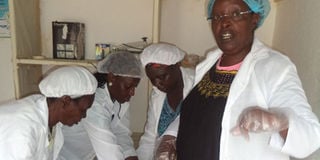Prime
Kashaka women improving livelihood through yoghurt

A women's entrepreneurs group demonstrate how milk is wrapped in a blanket as one of the processes of making yoghurt. file photo
What you need to know:
- Women in Kashaka, Bubaare Sub-county in Mbarara District have formed an association where they make probiotic yoghurt to improve livelihoods in their community, writes Zadock Amanyisa
Two years ago, four women from different walks of life wanted to do something that would see the village woman improve her health and lifestyle as well as that of the people in their community using the easiest means at their disposal.
Being that Ankole has a lot of cattle, the women including Joy Rwamahe, Edith Isharaza, Betty Muganwa Kajuga, and Joviah Rwebikoomi looked at how they could use milk gathered from cattle in their homes to improve lives. “We had no ready money for capital but we realised we could raise it easily and quicker if we formed an association,” says Isharaza.
Thus they paid Shs1,000 as membership fee and Shs15,000 as monthly subscription fees to Kashaka Women Entrepreneurs –the association that united them.
On their first day of production, they bought 20 litres of milk, 2kgs of sugar and firewood. They borrowed saucepans and milk cans from where they could produce yoghurt.
They sold their first product to the locals and made profit of about Shs17,000. The first release attracted demand from the community which they struggled to satisfy. They would sell a glass of yoghurt at Shs600. Because the women had nowhere to cook from, they secured a place under a tree near the dairy plant in Kashaka Trading Centre.
In November 2015, the association got connected to Yoba for Life Foundation, an organisation that promotes good health and economic development in communities in Africa. One of the NGO’s priorities is training communities in making yoghurt. And so this came in handy for Kashaka Women Entrepreneurs, a move that saw them get reasonable value for their product. The group has since then capitalised on having their product improved despite daily challenges.
They started packing the yoghurt in sachets and jerrycans and supplying it in surrounding homes and schools in Mbarara District.
“Our product comes in vanilla and strawberry flavours as well as plain. Despite people despising products made in their communities and preferring those in supermarkets, we managed to sell,” says Juliet Ahairwe, a member.
Currently, the women pack their yoghurt in capacities of 300ml, three litres, five and 10 litres which they sell at Shs1,500, Shs2,400, Shs12,000, and Shs2,400 respectively at wholesale price. Ingredients include milk, sugar, yoba culture (probiotic), vanilla, straw berry, and stabiliser which are altogether combined in flavoured and unflavoured form to suit people’s preferences.
Challenges
Aside from expensive packaging materials, the association faces lack of marketing skills and money to perfect their yoghurt to required standards, something that has made it hard for them to penetrate bigger markets. They are also not yet registered with Uganda National Bureau of Standards, a body that allows them to market their product beyond borders.
Despite all these, the women hope to buy equipment that will help them perfect their yoghurt, get transportation means such as motorcycles so as to reach markets.
The process
Step 1. Pour 50 litres of milk into a can which is placed in a saucepan of boiling water.
Step 2.Milk is heated up to 85 degrees, for about 15 minutes.
Step 3.Add about three-and-a-half kilogrammes of sugar.
Step 4.Reduce the fire for a few minutes and later put the can in another saucepan of cold water to let the milk cool to about 45 degrees which are measured using a thermometre.
Step 5.Yoba culture (live bacteria) is then added to kill all sorts of bacteria in the milk.
Step 6.The milk can is then wrapped in a blanket which is tied with a rope to keep the temperatures at 45 degrees where it spends about 12 hours.
Step 7.At about midnight, the can is unwrapped and taken outside the room to cool where it spends about six hours being cooled by winds to ferment.
Step 8.The can is taken back to the room at around 6am and yoghurt is ready.
Step 9. The product (yoghurt) is then packed in dry and clean bottles which are kept or stored in a deep freezer awaiting distribution.
Benefits of yoghurt
• Probiotic literally means “for life” where live organisms are administered in adequate amounts, confer a beneficial health effect on the consumer. When added to milk as starter culture in the fermentation process, the probiotic bacteria grows and multiplies to make yoghurt.
• It produces lactobacilli selected from a healthy gut to exhibit anti-pathogenic and anti-inflammatory capabilities which improve a person’s immunity without adverse effects.
• It prevents occurrences of diarrhea, reduces allergy symptoms, and improves gut comfort
Making a difference
The women entrepreneurs group makes about 600 litres of yoghurt per month depending on the market demand earning them about Shs14m in profits.
They spend part of the money on improving their enterprise such as buying packaging and branding materials, milk cans, saucepans, plunger and others since they are still in the starting stage of the business according to Isharaza.
Achievements
According to Juliet Ahairwe, the group has been able to raise money for office rent and kitchen, buy enough milk and open a bank account in a local Sacco for efficient management of the enterprise.
They have also obtained connections with organisations such as SNV and Heifer International which have helped them in acquiring equipment such as a freezer, have business trainings and quality control skills both on group and individual basis.
Currently, the group is registered with Diary Development Authority and Uganda Industrial Research Institute.




